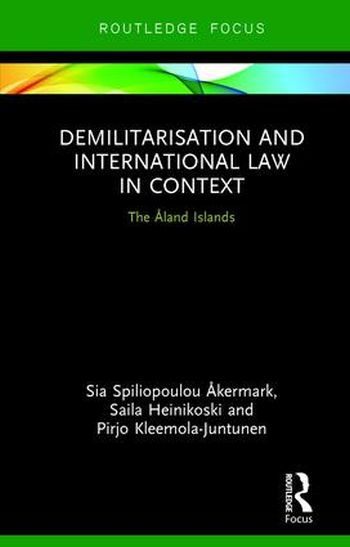
The demilitarisation and neutralisation of the Åland Islands is both a confirmation of and an exception to the collective security system prevailing in present day international affairs. There is no need for military presence in the territory of the islands and the islands are to be kept out of military activities, notwithstanding the right of Finland to defend its territory. The regime of demilitarisation and neutralisation of the Åland Islands relies upon the confidence building effect of a restricted use of military force and the preference for diplomatic communication and openness, or even contestation, on the basis of a legal agreement and longstanding practice. However, the security regime of the Åland Islands is also the result of a pragmatic compromise at a given moment and under conditions of a certain balance of power. It presupposes the ability of Finland to defend the demilitarisation and neutralisation primarily through diplomatic tools, but if needed also militarily. It is about the presence and the absence of the military at one and the same time. In this dual mode, the case of the Åland Islands, offers an alternative trajectory to the increased militarisation we witness around the world today.
Through parliamentary materials, international treaties, academic work and archives, the authors examine the legal rules and institutional structures of the demilitarisation regime in their broader position and practical implementation in international law. This book reassesses core concepts of international law and international affairs, such as (territorial) sovereignty and collective self-defence, and opens up for a theoretical view on the empirical case study of the Åland Islands. It offers a fresh and path-breaking coherent arguments and the insights are of relevance for the study of other cases of demilitarization, not only in the Nordic region (Svalbard) but also for the Antarctic regime, several islands in the Mediterranean, and open ended situations such as in Cyprus where the Kofi Annan plan included a demilitarization component.
Demilitarisation in an Increasingly Militarised World covers both legal as well as political and policy discursive aspects of demilitarization, international cooperation, defence and security matters around the Baltic sea with a broader European and global relevance. It can be a source of inspiration for civil society in particular within the peace movement in a broad sense and for all those in search of constructive and peaceful efforts that can address territorial conflicts and military confrontation in border regions and will be of interest to researchers, academics, policymakers, and students in the fields of international law, political science, European affairs, international relations, security studies, area studies, history, and conceptual history.